#Seven Against Thebes
Text
Time Travel Question 21: The Library of Alexandria (Miscellaneous III)
I welcome your suggestions for both Library of Alexandria and other lost works of World Literature and History, as there will be future polls.
#Time Travel#The Library of Alexandria#Little Iliad#Trojan War#Nostoi#Cypria#The Epigoni#Seven Against Thebes#Alcmeonis#Iliou Persis#Telegony#Ennius#Aristotle
39 notes
·
View notes
Text
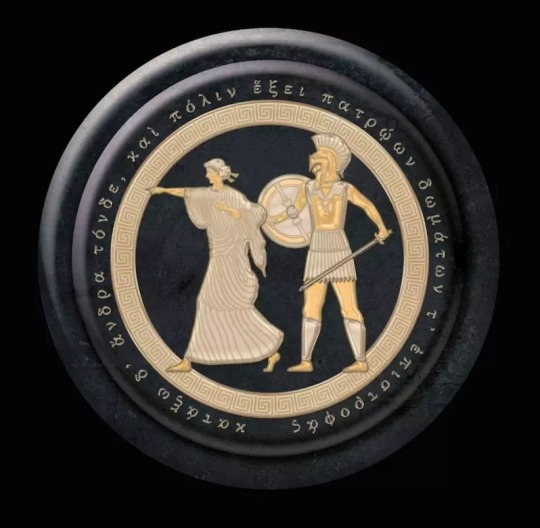
JENNY FROM THEBES (2023)
THE MOUNTAIN GOATS
κατάξω δ᾽ ἄνδρα τόνδε καὶ πόλιν ἕξει πατρῴων δωμάτων τ᾽ ἐπιστροφάς
"Last I will tell of the seventh champion, him at the seventh gate, your own brother, and of what fate he prays for and calls down on the city. His prayer is that after he mounts the battlements and is proclaimed king in the land, and shouts the paian in triumph over its capture, he may then meet you in combat, and once he kills you, that he may perish at your side, or, if you survive, make you pay with banishment in the same way as you dishonored him with exile. Mighty Polynices shouts such threats and invokes his native gods, the gods of his fatherland, to watch over his prayers in every way. He holds a shield, a perfect circle, newly-made, with a double symbol cleverly fastened on it: a woman modestly walking in the fore leads a man in arms made, it appears, of hammered gold. She claims to be Justice, as the lettering indicates, 'I will bring this man back and he will have his city and move freely in his father's halls.'"
-Aeschylus, Seven Against Thebes
26 notes
·
View notes
Text
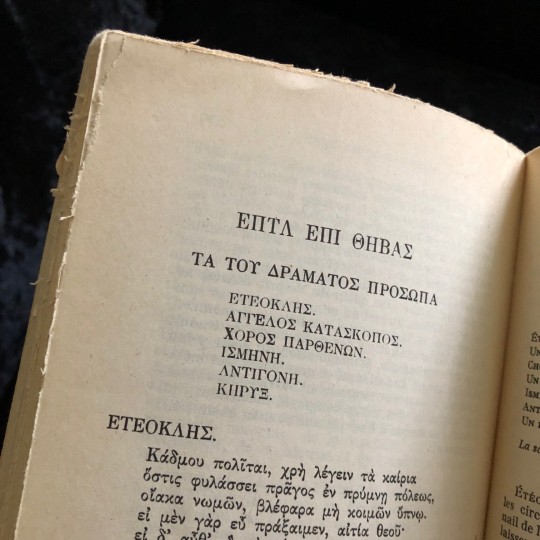
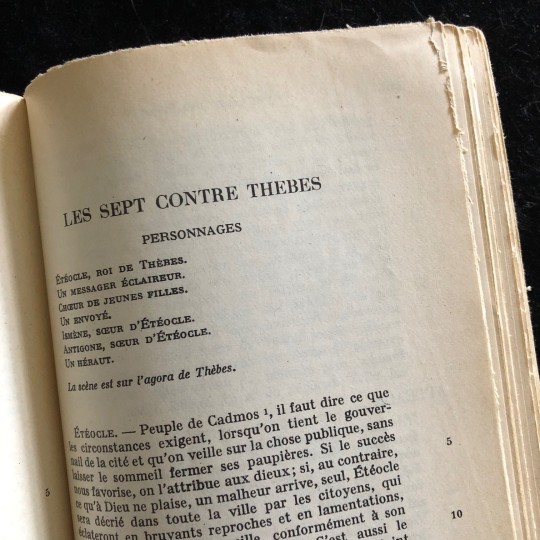
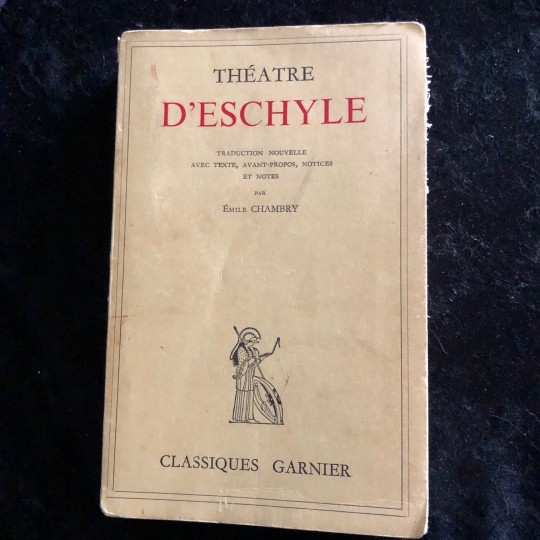
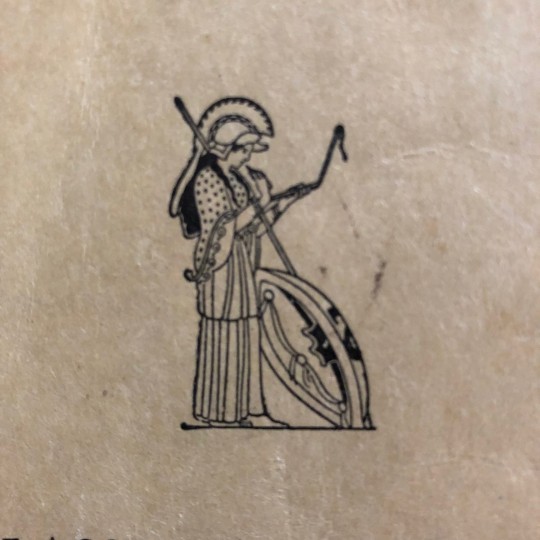
#what if the whole play was just messenger speeches#also this was printed in 1956 and I had to cut the pages myself#seven against thebes#aeschylus#ancient greek#tragedy#tragédie#book photography#livres#classics#classic academia#tagamemnon#ἐποίησα
9 notes
·
View notes
Text
Merciful Mother Persephone, hear my prayer and judge me true.
My name is Antigone.
I still have my name. I have lost more than I ever thought I could lose, but I still have my name. He cannot take that from me.
Dread Goddess Persephone, hear my story and avenge me well.
My uncle has tried to silence me, but he will not take my voice.
He locked me in this cell, but far too late. The people of Thebes have heard my words. They will rise up against my uncle's tyranny and repeat my message. My words will echo throughout the city long after I meet you in the Underworld. I shall be there soon.
Judge me on my own merits, not by the sins of my father and grandfather. Though their story is forever entangled with mine, it is their curse that led me here.
The curse which lay dormant all through our joyous childhood.
We spent many summers basking in the sun. My brothers, my sister, and I; how happy we were. We would play discus in the courtyard and explore the caves outside the city together.
We were happy.
We were blessed.
We were fools.
How were we to know just how fast our world could fall apart? How were we to predict the plague? The vile sickness spread throughout Thebes, covering our people with festering sores and filling their lungs with blood. The stench of death and human waste settled over the city like a black cloud.
Apollo must have cursed us. It was the only explanation. My father vowed to discover the reason why, so he could rectify the slight and save us all.
He should have let the plague take us. Then the world would have never known our family's story; the story of my mother's first son, the story of my father, the story of Oedipus.
Everything fell away after that. We were not blessed, The Gods were mocking us. Nursing us with honey so our first taste of ash would be all the more bitter.
Father couldn't handle the truth. He gouged out his own eyes and left Thebes.
My brothers were left to take up his role as king, but they couldn't decide on who was the rightful heir. My brothers were left to do what they did best; compete. We were no longer children. It was no longer a matter of who could throw the discus farthest or who could shove the most grapes in their mouth without choking. Now they had armies at their backs. Now they could use other men's lives as a part of their game.
Mother and I begged them both to stop. We watched as they met each other's blade. Their blood ran down the street, adding to the great red river that flowed past garbage and other corpses. Somehow I thought my brothers' blood would be different from that of a common soldier: gold from our royal birth or black from the abomination of our parents’ incest.
Eteocles’s death came swiftly, but Polynices struggled against Thanatos's embrace. Mother and I ran to him. Mother cradled his head like he was still a babe. I held his entails inside him. His intestines were warm and slick under my hands. I was his older sister. I was supposed to keep him safe, but I couldn’t force the blood back inside. He whimpered in Mother’s arms, blood bubbled out of his lips. He met my eyes, I could feel his fear in the core of my soul. With his last disjointed breath he asked me to give him funeral rites, to allow him to rest in the tomb of our forefathers. I vowed that I would. Then he shuddered in Mother’s arms and grew still.
Polynices. Eteocles.
They were my brothers.
My little brothers.
They loved each other, they really did. It was the curse that drove them mad.
My mother couldn’t handle it. The moment Polynices’s eyes glazed over she pulled a dagger from his belt and plunged it into her own chest.
Mother…
Dear Goddess, please show her pity. The love of your own mother is legendary. Even now I can feel her sorrow for you in the late winter chill. My mother’s life had not been easy. I fear she will only be judged on her marriage. She is so much more than that. She was a gentle mother and a respected Queen. She was the strongest woman I knew, but how much could a single woman lose? I didn’t even attempt to stop her.
With both my brothers dead, my mother’s brother took the throne of Thebes. When I told him of Polynices’s final plea, he scoffed at me. The way he saw it, Polynices was the usurper. His rebellion caused so much bloodshed in Thebes. My uncle declared that while Mother and Eteocles would receive full funeral rites and laid to rest in the family tomb, Polynices corpse was to be left for animals to feast upon.
I raged against his ruling. Polynices may have been a fool for rebelling, but he was still the prince of Thebes. He was still a part of this family.
My uncle berated me for speaking out of term. I was a woman, I was not to speak out against the king.
Damn his rules. Damn propriety. I have no more patience for the men in this family. My grandfather, my father, my brothers, my uncle: all of them suffer from the madness of the Curse. I would bury Polynices, even if I had to do it alone.
He caught me, but he couldn’t execute me. The people of Thebes were on my side. Even if Polynices raised an army against the city, leaving him to rot in the streets would surely anger the Gods even more. So he imprisoned me deep within the castle. Perhaps he thinks if he keeps me isolated for long enough I will change my stance. Perhaps he thinks the people of Thebes will forget about me. He is a fool.
I will die on my terms, I will not live on his.
So I call out to you, Persephone, Queen of the Underworld, to accept me into your embrace as I slip a coin under my tongue and a rope around my throat.
My name is Antigone, and I will meet you soon.
111 notes
·
View notes
Text
As much as I dislike academia and the over-analysis of classic literature, I’ve recently been reading some ancient Greek tragedies, and I do have something to say about the sons of Oedipus real quick. Just as a casual observer:
In Seven Against Thebes I did not pity Eteocles that much, even though he was depicted as the victim of an unjust siege at the hands of his brother, because he was kind of a jerk. But I did pity the chorus, as completely innocent citizens in danger of being raped, killed, or enslaved if the siege succeeded.
In Phoenician Women, I did not pity Polynices that much, even though the text made it implicitly clear that his siege was justified and Eteocles was the one being unjust, because in their every interaction, he just kept matching Eteocles’ jerk energy. I didn’t feel that strongly about the chorus either way because I was mostly just confused as to why they were there, narratively speaking.
The only aspect that really broke my heart the way a good tragedy always should was Menoeceus’ death, and Creon’s reaction to it.
Incidentally, I never pitied Oedipus himself that much, either, because although what happened to him was terrible, and he genuinely did not know what he was doing, he did kill four people in a traffic dispute on his way to Thebes, and then he was never punished for that...
#I'd like to know why the hell Creon wasn't just made king after Laius died straight away#feel like that could have solved some of our problems before they happened#mythology#Seven Against Thebes#Phoenician Women#Oedipus Rex
2 notes
·
View notes
Text
I have returned with a sure report of the army outside the walls; I myself am an eyewitness of their actions. Seven warriors, fierce regiment-commanders, slaughtered a bull over a black shield, and then touching the bull’s gore with their hands they swore an oath [45] by Ares, by Enyo, and by Rout who delights in blood, that either they will level the city and sack the Cadmeans’ town by force, or will in death smear this soil with their blood. And on Adrastus’ chariot they were placing remembrances of themselves [50] for their parents at home, and were shedding tears while so doing, but no piteous wailing escaped their lips. For their iron-hearted spirit heaved, blazing with courage, as of lions with war in their eyes.
- Aeschylus, Seven Against Thebes 39
11 notes
·
View notes
Text
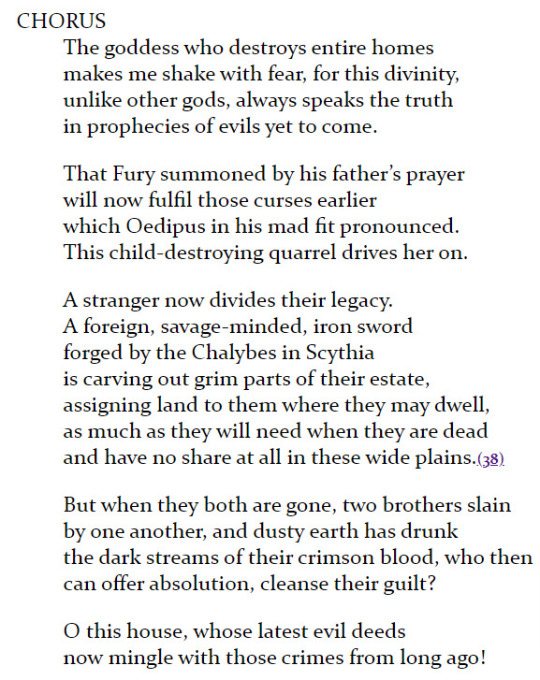
Seven Against Thebes, Aeschylus
trans. Ian Johnston
0 notes
Text
Parthenopeus dying!! while he apologizes to his mother!! i am unwell
#thebaid#seven against thebes#tagamemnon#queueusque tandem abutere catilina patientia nostra#classics#classical literature#the aeneid#homer#the iliad#greek mythology#latin literature#roman mythology#aeschylus
1 note
·
View note
Text
Watch "Who was Diomedes? | Early Life of the Argive Hero" on YouTube
youtube
0 notes
Text
What if your best friend was married to your sister and you knew that if you went on a certain trip with your best friend to go sack a city for revenge or something that you’d all die because you’re psychic but your sister told you that you have to go because she’s the one that settles disputes in this family so you go and then you died just like you predicted because your friends decided to storm a city with seven guys would that be messed up or what
55 notes
·
View notes
Text
List just for fun, since I think a lot of people don’t remember these days how many PJO characters are themed around specific mythological figures -
Some PJO characters and their primary mythological basis/counterparts:
Percy - Obviously, Perseus, but also Theseus
Annabeth - Atalanta (Also where she gets her name)
Jason - Jason, again obviously
Piper - Unconfirmed, but most likely Orpheus
Leo - Demophon of Eleusis
Frank - Meleager
Castor & Pollux - Castor & Pollux
Silena Beauregard - Patroclus
Clarisse la Rue - Achilles
Thalia - Thalia, the Charity (Grace) (yes, PJO Thalia’s name is a pun) and possibly Odysseus
And as a bonus - Books/series and their primary myths/story basis:
The Lightning Thief - Several myths, primarily relating to Perseus and Theseus
Sea of Monsters - The Odyssey / The Argonautica
The Titan’s Curse - the Labours of Hercules
Battle of the Labyrinth - Daedalus’ Labyrinth, obviously
The Last Olympian - The Titanomachy / The Iliad
Heroes of Olympus - Seven Against Thebes / Jason & the Argonauts / The Gigantomachy
Blood of Olympus - The Gigantomachy / Seven Against Thebes / Battle of the Lacus Curtius
Trials of Apollo - Apollo slaying Python / Apollo as a mortal serving King Admetus of Pherae
#pjo#percy jackson#hoo#heroes of olympus#annabeth chase#jason grace#piper mclean#leo valdez#frank zhang#i unfortunately dont know if Hazel has a particular individual hero she's based on#same for Nico and Reyna though their roles in HoO definitely mirror some stuff in Seven Against Thebes
174 notes
·
View notes
Text
cool classical reception going on w the mountain goats i just wish that guy could actually sing
#seven against thebes!#unfortunately i cannot stand the sound of. most of their discography :/#beeps
25 notes
·
View notes
Text
Googling how long the odyssey is and finding out it’s like just the right size of book that I like feels weird. Like I feel like it should be longer probably. 1000 pages minimum yknow
#at least the Iliad is 700#the again seven against Thebes is only 300??#finding out the odyssey is the same length as the last fantasy book I read feels wild
3 notes
·
View notes
Text
i hate john darinelle im really gonna read a fuckin greek play for this album arent i
#ok mr library man give me your finest copy of seven against thebes lets get this ball rolling#jenny from thebes#aub talks#(im saying this like i dont goddam love greek plays)
4 notes
·
View notes
Text
"The Timeless Power of Tragedy: A Review of Prometheus Bound and The Seven Against Thebes by Aeschylus"

In the annals of ancient Greek drama, Aeschylus stands as a towering figure, and his works "Prometheus Bound" and "The Seven Against Thebes" exemplify the enduring power and complexity of Greek tragedy. Translated by Theodore Alois Buckley, these timeless masterpieces continue to captivate audiences with their exploration of timeless themes such as fate, justice, and the struggle between gods and mortals.
"Prometheus Bound" opens with the titular character, Prometheus, chained to a rock as punishment for defying Zeus by giving fire to humanity. Buckley's translation vividly captures the agony and defiance of Prometheus as he suffers at the hands of the vengeful gods. Through Prometheus's steadfast resolve and defiance, Aeschylus raises profound questions about the nature of authority, rebellion, and the price of knowledge. The translation preserves the poetic richness and rhetorical power of Aeschylus's language, allowing readers to immerse themselves in the timeless drama of Prometheus's plight.
In contrast, "The Seven Against Thebes" unfolds against the backdrop of the legendary conflict between two brothers, Eteocles and Polynices, for control of the city of Thebes. Buckley's translation masterfully conveys the intensity and urgency of the unfolding tragedy as the two brothers lead their respective armies into battle. Through vivid imagery and stirring dialogue, Aeschylus explores themes of fate, destiny, and the inexorable cycle of violence that plagues humanity. The translation retains the rhythmic cadence and dramatic tension of the original Greek, ensuring that readers are swept up in the epic sweep of the narrative.
What makes Aeschylus's tragedies truly timeless is their ability to transcend the boundaries of time and culture, speaking to universal truths about the human condition. In both "Prometheus Bound" and "The Seven Against Thebes," Aeschylus grapples with questions of morality, justice, and the nature of divine power, offering profound insights into the complexities of the human experience. Buckley's translation admirably captures the depth and nuance of Aeschylus's vision, allowing contemporary readers to appreciate the enduring relevance of these ancient works.
In conclusion, "Prometheus Bound" and "The Seven Against Thebes" stand as enduring monuments to the power of Greek tragedy, and Theodore Alois Buckley's translation ensures that these timeless masterpieces continue to resonate with readers today. Through their exploration of timeless themes and profound insights into the human condition, Aeschylus's tragedies remind us of the enduring power of storytelling to illuminate the darkest corners of the human soul.
"Prometheus Bound" and "The Seven Against Thebes" by Aeschylus is available in Amazon in paperback 10.99$ and hardcover 18.99$ editions.
Number of pages: 138
Language: English
Rating: 10/10
Link of the book!
Review By: King's Cat
#Prometheus Bound#The Seven Against Thebes#Aeschylus#Greek Tragedy#Ancient Drama#Mythology#Mythological Characters#Gods and Mortals#Fate#Destiny#Justice#Rebellion#Defiance#Punishment#Consequences#Humanity#Morality#Ethical Dilemmas#Power Struggles#Conflict#War#Epic Tragedy#Hubris#Divine Retribution#Family Feuds#Sibling Rivalry#Thebes#Chorus#Dramatic Irony#Rhetorical Devices
0 notes
Text
"The Timeless Power of Tragedy: A Review of Prometheus Bound and The Seven Against Thebes by Aeschylus"
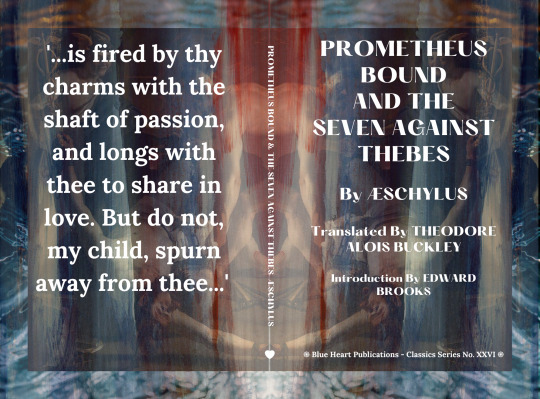
In the annals of ancient Greek drama, Aeschylus stands as a towering figure, and his works "Prometheus Bound" and "The Seven Against Thebes" exemplify the enduring power and complexity of Greek tragedy. Translated by Theodore Alois Buckley, these timeless masterpieces continue to captivate audiences with their exploration of timeless themes such as fate, justice, and the struggle between gods and mortals.
"Prometheus Bound" opens with the titular character, Prometheus, chained to a rock as punishment for defying Zeus by giving fire to humanity. Buckley's translation vividly captures the agony and defiance of Prometheus as he suffers at the hands of the vengeful gods. Through Prometheus's steadfast resolve and defiance, Aeschylus raises profound questions about the nature of authority, rebellion, and the price of knowledge. The translation preserves the poetic richness and rhetorical power of Aeschylus's language, allowing readers to immerse themselves in the timeless drama of Prometheus's plight.
In contrast, "The Seven Against Thebes" unfolds against the backdrop of the legendary conflict between two brothers, Eteocles and Polynices, for control of the city of Thebes. Buckley's translation masterfully conveys the intensity and urgency of the unfolding tragedy as the two brothers lead their respective armies into battle. Through vivid imagery and stirring dialogue, Aeschylus explores themes of fate, destiny, and the inexorable cycle of violence that plagues humanity. The translation retains the rhythmic cadence and dramatic tension of the original Greek, ensuring that readers are swept up in the epic sweep of the narrative.
What makes Aeschylus's tragedies truly timeless is their ability to transcend the boundaries of time and culture, speaking to universal truths about the human condition. In both "Prometheus Bound" and "The Seven Against Thebes," Aeschylus grapples with questions of morality, justice, and the nature of divine power, offering profound insights into the complexities of the human experience. Buckley's translation admirably captures the depth and nuance of Aeschylus's vision, allowing contemporary readers to appreciate the enduring relevance of these ancient works.
In conclusion, "Prometheus Bound" and "The Seven Against Thebes" stand as enduring monuments to the power of Greek tragedy, and Theodore Alois Buckley's translation ensures that these timeless masterpieces continue to resonate with readers today. Through their exploration of timeless themes and profound insights into the human condition, Aeschylus's tragedies remind us of the enduring power of storytelling to illuminate the darkest corners of the human soul.
"Prometheus Bound" and "The Seven Against Thebes" by Aeschylus is available in Amazon in paperback 10.99$ and hardcover 18.99$ editions.
Number of pages: 138
Language: English
Rating: 10/10
Link of the book!
Review By: King's Cat
#Prometheus Bound#The Seven Against Thebes#Aeschylus#Greek Tragedy#Ancient Drama#Mythology#Mythological Characters#Gods and Mortals#Fate#Destiny#Justice#Rebellion#Defiance#Punishment#Consequences#Humanity#Morality#Ethical Dilemmas#Power Struggles#Conflict#War#Epic Tragedy#Hubris#Divine Retribution#Family Feuds#Sibling Rivalry#Thebes#Chorus#Dramatic Irony#Rhetorical Devices
1 note
·
View note